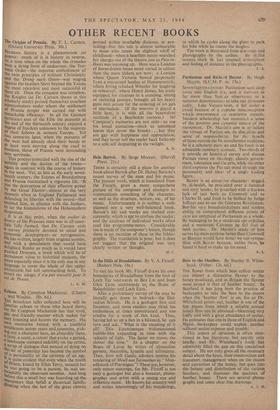Puritanism and Richard Baxter. By Hugh Martin. (S.C.M. P, css:
15s.)
SEVENTEENTH-CENTURY Puritanism sank deep roots into English live, and it survives in far more than Sum'ay observance or a national determinatioa to take our pleasures sadly. Like Victoria nism, it fell under a cloud because of a popular misconception which overstressed its restrictive aspects. Modern scholarship has recovered a sense of the positive and dynamic nature of the movement. Dr. Martin's aim is to isolate the virtues of Puritanism, its disc,pline and sense of responsibilay, for th..: benefit of those outside the Nt nconformist tradition; he is a scholarly parti an and his book is an admirable summary account. Two-thirds of it provide an historit al survey and discuss Puritan views on theology, church govern- ment, toleration and the.arts, while the other third explores the Pur.tan mind through the personality and ideas of a single leading figure.
Baxter is an attractive character: dogged by ill-health, he proeluced over a hundred and sixty books; he preached with a fearless Jack of tact both to Cromwell and to Charles II, and lived to be bullied by Judge Jeffreys and to see the Glorious Revolution. But-his very broadmindedness and restless ability to comprehend different points of view are untypical of Puritanism as a whole. By managing to be a moderate epi..copalian and a moderate Calvinist he fell foul of both parties. Dr. Martin's study of him serves his main purpose better than Cromwell or Bunyan would have done: we can sympa- thise with Baxter because, unlike them, he found it hard to make tip his mind.


































 Previous page
Previous page